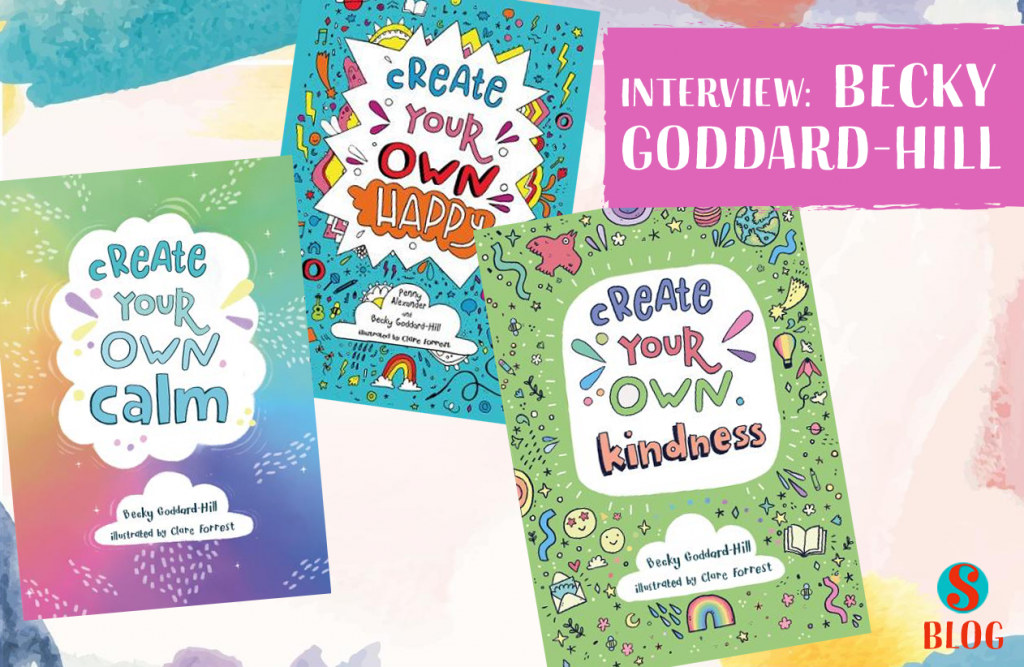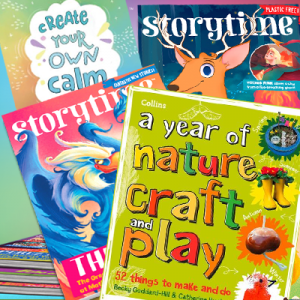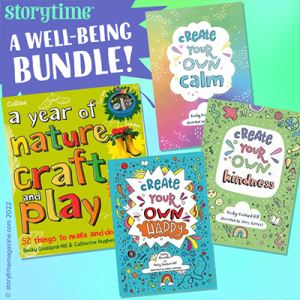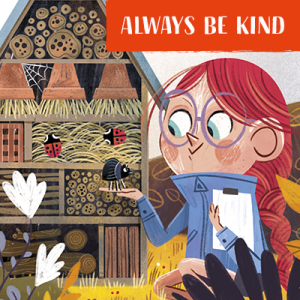
We here at Storytime believe it’s vitally important to talk about mental and emotional health – that’s why we discuss these topics on this blog and in the My Mind Matters section of the magazine every month.
Children’s Mental Health Week is being held on 7-13 February 2022, and this year’s theme is Growing Together. You can find out more about it here. Useful resources from the Red Cross can downloaded here as well.
This year, we have joined Children’s Mental Health Week by giving away a complete set of activity books by author, blogger and psychotherapist Becky Goddard-Hill in our monthly competition on Social Media. These wonderful volumes are sure to inspire children to learn about their emotions through play, and we were lucky enough to get a chance to chat with Becky about her work and find out more about what inspires her too!
Storytime: You have been really busy writing your books and your excellent Emotionally Healthy Kids blog! Can you tell us a bit more about what inspired you to start blogging?
Becky Goddard-Hill: Before I had children, I was a social worker and ran a small private psychotherapy practice for kids. I loved working with children and helping them feel strong, empowered, resourceful and able to cope with life’s challenges.
I stopped doing face-to-face work when I had my own kids, but I still had time to write. Sharing what I knew online at Emotionally Healthy Kids seemed to be a great solution. In recent years I have started direct practice again, but I still love vlogging, podcasting and writing for and about emotionally healthy kids.
Storytime: How crucial do you think it is to focus on mental health and discuss it openly, especially after the challenges of the last couple of years?
Becky Goddard-Hill: Good mental health makes home and school life easier, happier, smoother, and better in every way. Promoting it should be at the heart of parenting and education, in my opinion!
Life has been tricky for everyone over the past few years, and children have experienced living with uncertainty, poverty, stress, and illness, away from their friends and the security of school and their usual routine. This has made many children feel isolated, insecure, and anxious. It is so important to support children and help them to feel stronger, more resilient, and more confident so they can cope with life and the challenges it brings.
 Storytime: Your books encourage creativity and interaction with nature. What role do you think they can play in nurturing children’s mental health?
Storytime: Your books encourage creativity and interaction with nature. What role do you think they can play in nurturing children’s mental health?
Becky Goddard-Hill: Nature is healing, it is accessible, and it is free, so it makes a wonderful play resource for children! Even kids living in urban environments can visit parks, cloud-watch, plant wildflower seed bombs and explore. Connecting with nature is therapeutic as well as fun – it slows down children’s busy minds and helps them relax whilst also making them feel connected to and protective of the world around them.
Creativity has a similar absorbing and mindful effect, allowing kids’ worries about the past and fear of the future to subside as they focus on the present, using their imaginations and getting lost in what they are making. The flow of creative pursuits is wonderful for stressed minds and one of the key sources of deeper happiness.
Storytime: Could you share any tips on how we can encourage creative play with their children on a day-to-day basis?
Becky Goddard-Hill: We need to make time for play, so try to avoid back-to-back scheduled activities!
Storytime: How important do you think storytelling is for developing a creative environment at home?
Becky Goddard-Hill: My books contain lot of stories of real-life heroes, of inspiring historical figures and awesome inventors. Stories are amazing!
They are also a brilliant way to share messages of resilience and problem-solving, introduce kindness superstars and diversity issues, celebrate uniqueness, and so much more.
Children love stories, and they help to start conversations that are so important in a creative and emotionally healthy home. Stories allow the imagination to take flight, inducing feelings of calm and passion, adventure and resolution. They need to be at the very centre of a creative home.
Storytime: Have you considered writing stories for children as well or talking about emotional mental health through stories?
Becky Goddard-Hill: Yes, I have done this a few times for children I have worked with to help them through specific issues, and this is something I am looking to do more of for the public in future.
 Storytime: We are very happy to be sharing the “Create your own…” series bundle with our readers this month. They highlight calm, happiness and kindness as very important emotional concepts. Would you suggest reading them in a particular order?
Storytime: We are very happy to be sharing the “Create your own…” series bundle with our readers this month. They highlight calm, happiness and kindness as very important emotional concepts. Would you suggest reading them in a particular order?
Becky Goddard-Hill: They can be read in any order, and the activities can be dipped in and out of, too! I would say that if your child is experiencing a low mood, start with Create Your Own Happy. If they get stressed, start with Create Your Own Calm, and if they struggle with being kind to themselves, start with Create Your Own Kindness. There are a wide variety of fun activities in the books, and they are so beautifully illustrated that kids find them very appealing. I hope your children will enjoy taking a good look though and picking out the activities they like.
Storytime: This week we celebrate Children’s Mental Health Week – but it is something we should focus on all year around. Could you share three mentally healthy habits we can add to our little ones’ routine to help raise emotionally healthy children?
Becky Goddard-Hill: You are so right! We do need to focus on it all year round, daily when possible. These habits can help:
Affirmations
Affirmations are a lovely way to start the day! As your child brushes their teeth each morning, have them repeat one of the following sentences to themselves so they feel confident and clear about their capabilities as they start their day:
- I am strong
- I am kind
- I am a good friend
- I can do difficult things
Gratitude
Gratitude is a proven way to help reduce stress and promote habits of positive thinking. Make it a habit for your child to say what they are thankful for on the way home from school or over dinner – and share your own gratitude, too!
 Self-kindness
Self-kindness
Self-kindness is a key concept to teach kids! We want it to become so ingrained that it will become their natural response to tough times.
Encourage your child to make a list of all the nice things they can do to cheer themselves up. Ideas could include:
- Listening to music
- Snuggling in their favourite blanket
- Cuddling their pet
- Taking a long bath
- Rereading their favourite story
- Calling their grandma
Have them keep their list somewhere safe. Suggest that they do something on that list every day, and add to it all the time! Explain that whenever they are feeling down, self- kindness can lift them up – and they should choose an activity from their list.
Learning to meet tough times with increased self-love is a positive mental health habit for life! It is never too early to teach kids to be positive, grateful and self-caring. The teen years can be tricky, and kids need coping strategies in place in order to deal with them well.
Storytime: Thank you so much for sharing your insights with us today, Becky! I’m sure our readers will find your books and blogs invaluable!
You can check out Becky’s blog at https://emotionallyhealthykids.com/.
Her books can be found at https://harpercollins.co.uk/collections/books-by-becky-goddard-hill or on Amazon here.
What good habits are you putting into practice this year? Share your thoughts with us – and keep following My Mind Matters! every month! For our part, we are grateful to have such awesome readers and the opportunity to share our stories and creative activities with you all. We look forward to bringing you another year of fun and happiness in the pages of Storytime!




